So what are the competitor analysis tools for the “rest of us”? Here’s a selection of excellent tools that offer the same functionalities as these enterprise-level solutions, and more, for under $300 each or even for free:
- Competitors App — best budget tool for all-in-one competitor monitoring. This tool will keep you notified of content published by your competitors, and all content about your competitors, all in one place. Price: $19.9/mo.
- Ahrefs — best for SEO and SEM competitor tracking and analysis. Use it for a deep dive into SEO and search ad analysis and steal traffic from your competitors’ most successful content. Price: $129/mo (Starter plan available at $29).
- Visualping — best UX, CRO, and website competitor monitoring. Whenever the competitor changes something on their site, you’ll be the first to know. Price: $10/mo (free plan available).
- Brand24 — best for social media competitive tracking and analysis. See what people like and dislike about your competitors and use it to make improvements in your product or service. Price: $99/mo.
- SparkToro — best for competitor audience analysis. If you want to reach your competitors’ audience, this is how you’ll find them. Price: $50/mo, free plan available.
- Mailcharts — best for email and SMS competitor monitoring. Copy competitors’ best ideas for newsletters, email workflows, and email blasts, and make your work easier. Price: $149/mo.
- vidIQ — best for YouTube competitor analysis. Grow your YouTube channel by reverse-engineering your competitors’ success. Pricing: $10/mo, free plan available.
- Official ad libraries — best for social media PPC competitor intelligence. Snoop on your competitors’ campaigns to make your ads stand out. Free.
- BuiltWith — best for website tech stack analysis tool. Interestingly, you can also see who uses your competitors and get a list of potential leads. Price: $295/mo.
- ChatGPT — does the heavy lifting of data analysis, data cleaning & visualization for reports and analyzing competitors’ content. Can compensate for some AI features of enterprise solutions. Price: 20$, free plan available.
How I tested the tools
I wanted to find the best tools for small and medium businesses (i.e., affordable and flexible pricing) and, at the same time, collate a list of tools that cover all marketing channels you may want to monitor (SEO, social media, email, etc.).
I personally also tested all of these tools to see if they live up to their promise and some I’ve been relying on for years. So in the remaining part of the article, I’ll share a few solid ideas on how to make good use of these tools and highlight one handpicked awesome feature from each.
Finally, I update this article from time to time to see if there new tools, better tools, updated pricing, or new noteworthy features. So, what you see is the latest version of this evolving guide.
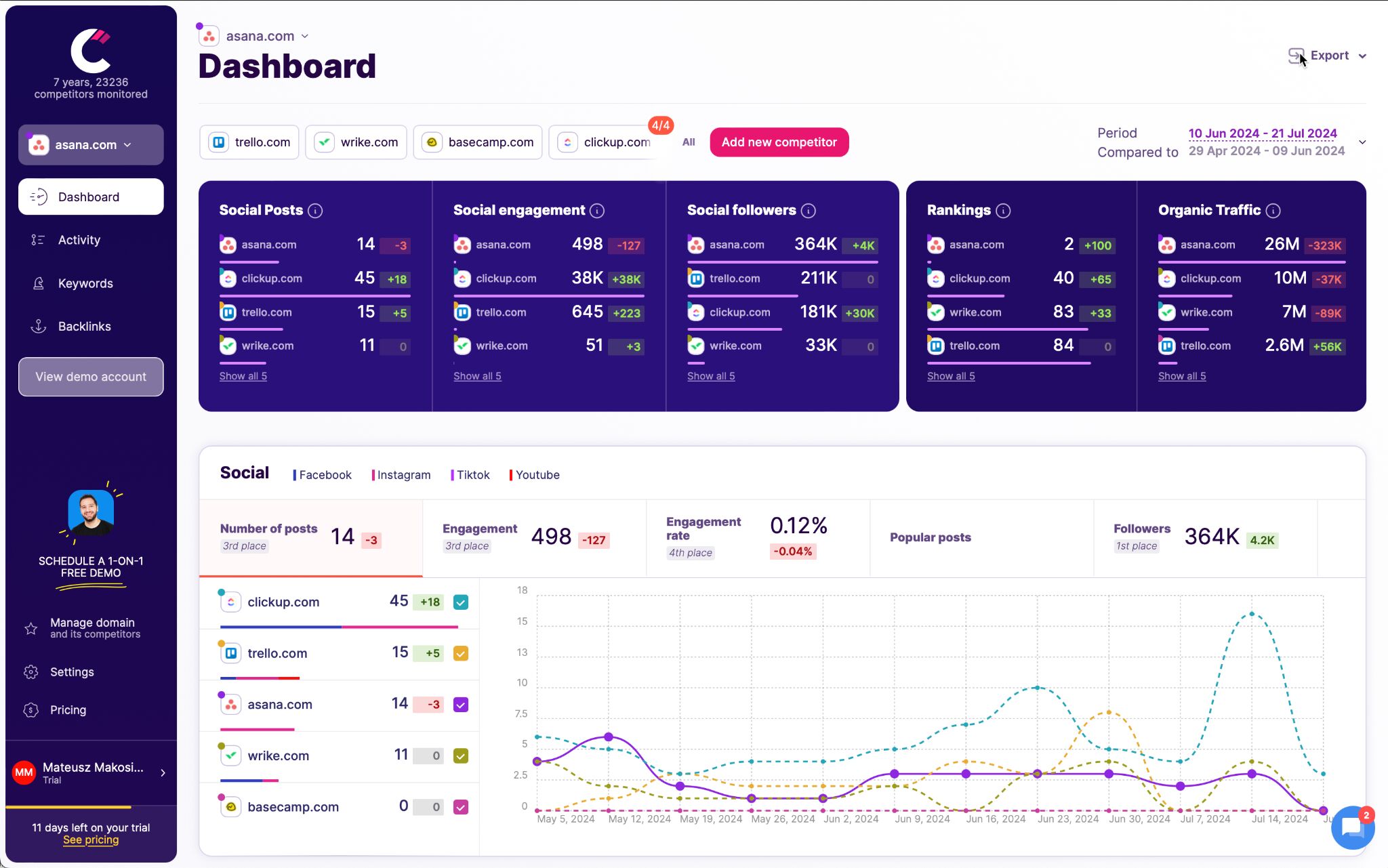
Competitors App monitors a long list of your competitors’ marketing channels, including emails, newsletters, blog posts, social media posts, website changes, organic search, ads, and serves it to you on a nice competitive analysis dashboard.
This tool is like having a dedicated daily newspaper exclusively about your competitors. So, if you’re looking for a single platform to log into each morning to see what your competitors have been up to — without breaking the bank — this is the solution for you.
While it’s an all-in-one solution for virtually every marketing channel, don’t expect the robust analysis capabilities found in more specialized tools on our list. However, for entry-level competitor monitoring to help you stay informed, it’s hard to find anything more cost-effective.
How to use it:
- Use the dashboard to gain daily top-level insights on your competitors activity on the web and compare them to yours. Look for spikes in social media engagement, higher publishing output, trends in organic traffic, or movements in the most important keywords. The reviews feature also allows you to see online activity about your competitor such as reviews.
- Never miss a new blog post, an email, or an important social media post from your competitors. No need to jump between apps.
- Document noteworthy competitor activity. When you see something interesting, you can add a note on the spot and notify your teammates right from the app.
Standout feature: Monitoring all marketing channels for publications and mentions
Competitors App has a feature called Activity which works like an RSS feed for everything your competitors say online and everything that is said about them.
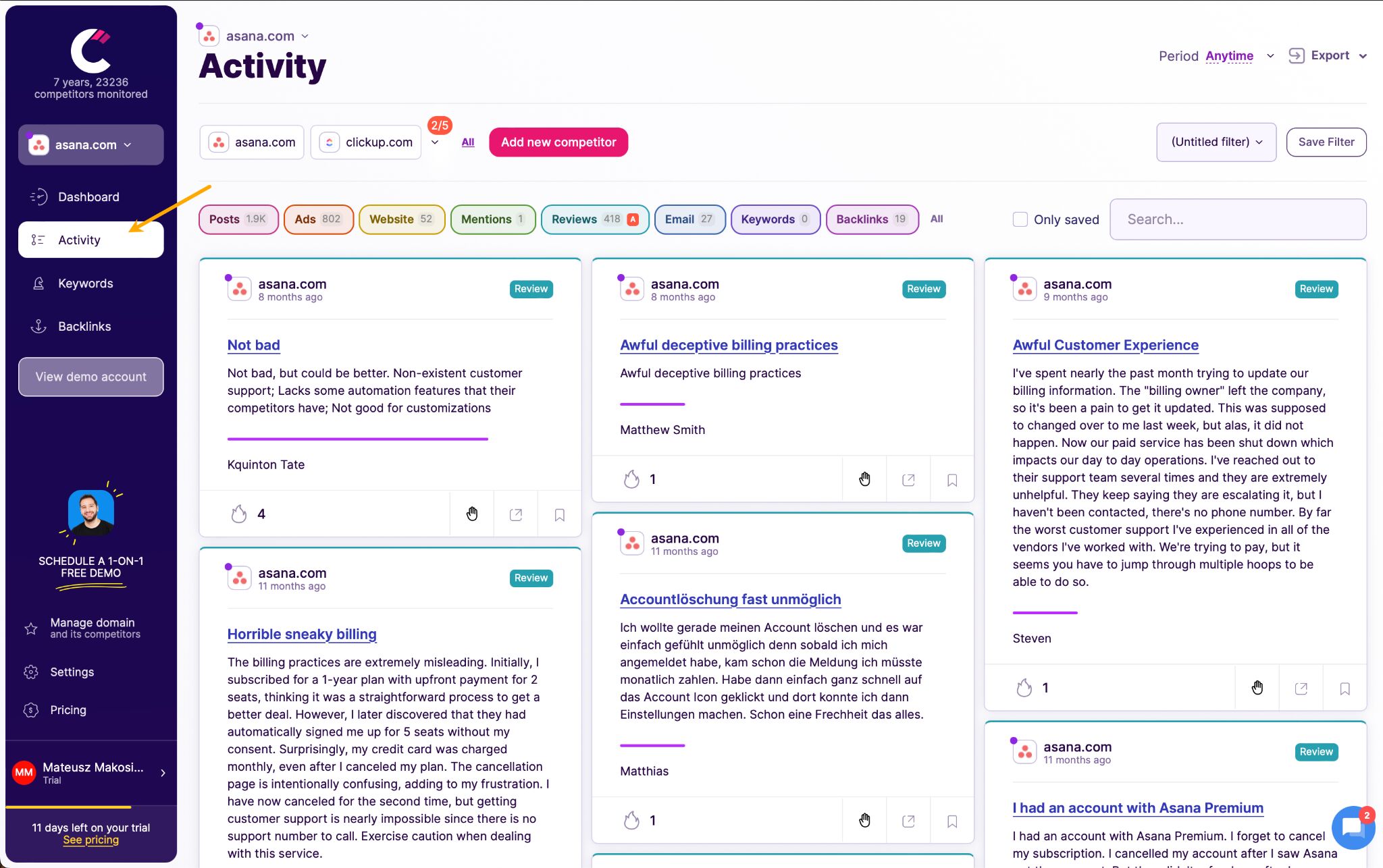
The list of things you can see in the Activity feed is quite impressive:
- Social media posts.
- Ads (live and archive).
- Website changes (such as a new page published or a change in the title of a page)
- Online mentions.
- Reviews (you can filter for specific ratings).
- Email.
- Keywords.
- Backlinks.
Thanks to this, you’ll stay informed about every move your competitors make across various marketing channels, and you save time and effort on jumping between different tools and sources.
For example, you can quickly spot new content or campaigns launched by your competitors and gauge their impact on their audience. For example, if you notice a competitor gaining traction with a particular type of content or social media post, consider how you can adapt and improve upon that approach for your audience.
To make it even easier, the Competitors App features a newsletter that delivers this activity feed directly to your inbox.
Pricing
Competitors App offers a cheap entry point at $19.9 per month, but that price is based on the number of sites you track. So, for monitoring two competitors, you’ll pay almost $40, for three, almost $60, and so on. To access all monitoring features, you’ll pay $29.90 per competitor. This is still very competitive compared to what enterprise solutions ask.
If I were you, I’d be curious about the Custom tier. Since the tool is quite affordable, you may get some premium features like custom channel tracking, human-curated reports, and battle cards and still save money.
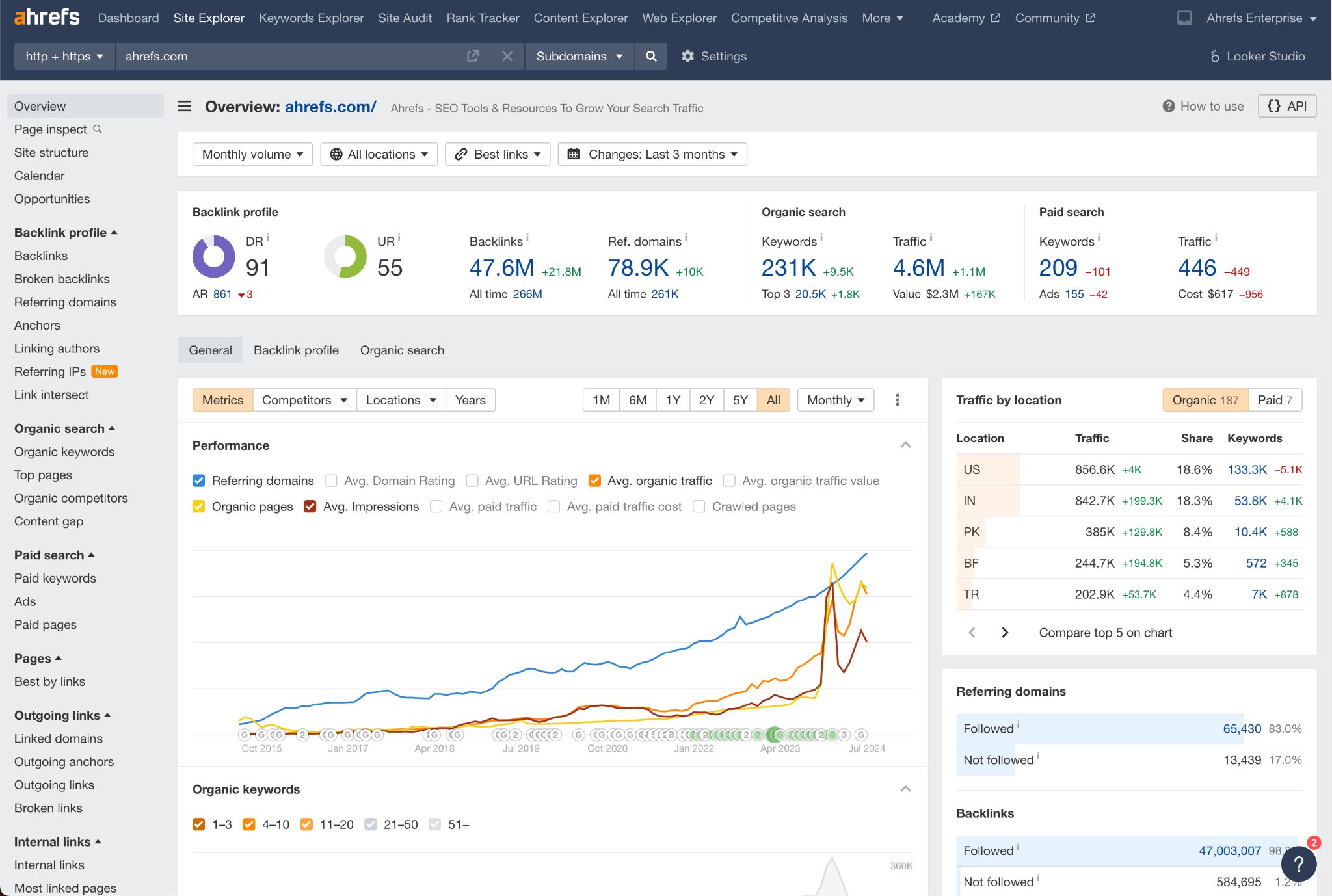
Ahrefs is an all-in-one SEO toolset that provides best-in-class data about your competitors’ content, backlinks, keywords, PPC ads, and much more.
Ahrefs has a reputation for best-in-class data and robust functionality, making it one of the industry’s favorites (see what the industry says about Ahrefs). So, if you need to dive deep into SEO data, you can’t go wrong here.
How to use it:
- Identify content gaps between you and your competitors to generate new content ideas. A content gap consists of keywords that your competitors rank for, but you do not. By filling these gaps, you can not only increase your own traffic but also potentially reduce your competitor’s traffic by outranking them.
- See where your competitors get their backlinks from to replicate their tactics or go after their links. For example, you might discover that your competitor has broken pages on their site, providing you with an opportunity to capture those links.
- Monitor your organic share of voice to increase it relative to your competitors. Share of voice is a useful metric because it always shows you if a change in traffic has been caused by competitors and not a change in search demand or a change in how Google shows the SERPs.
Standout feature: Finding content gaps between you and your competitors
This feature shows keywords for which your competitors rank, but you don’t. As I already mentioned, these are called content gaps and can give you proven content ideas for your content planning.
With Ahrefs, you can compare entire domains and get new topic ideas. Or, you can compare pages and see what subtopics your content may be missing — a potential reason for lower rankings.
Go to the Competitive Analysis tool and enter your domain and competitors.
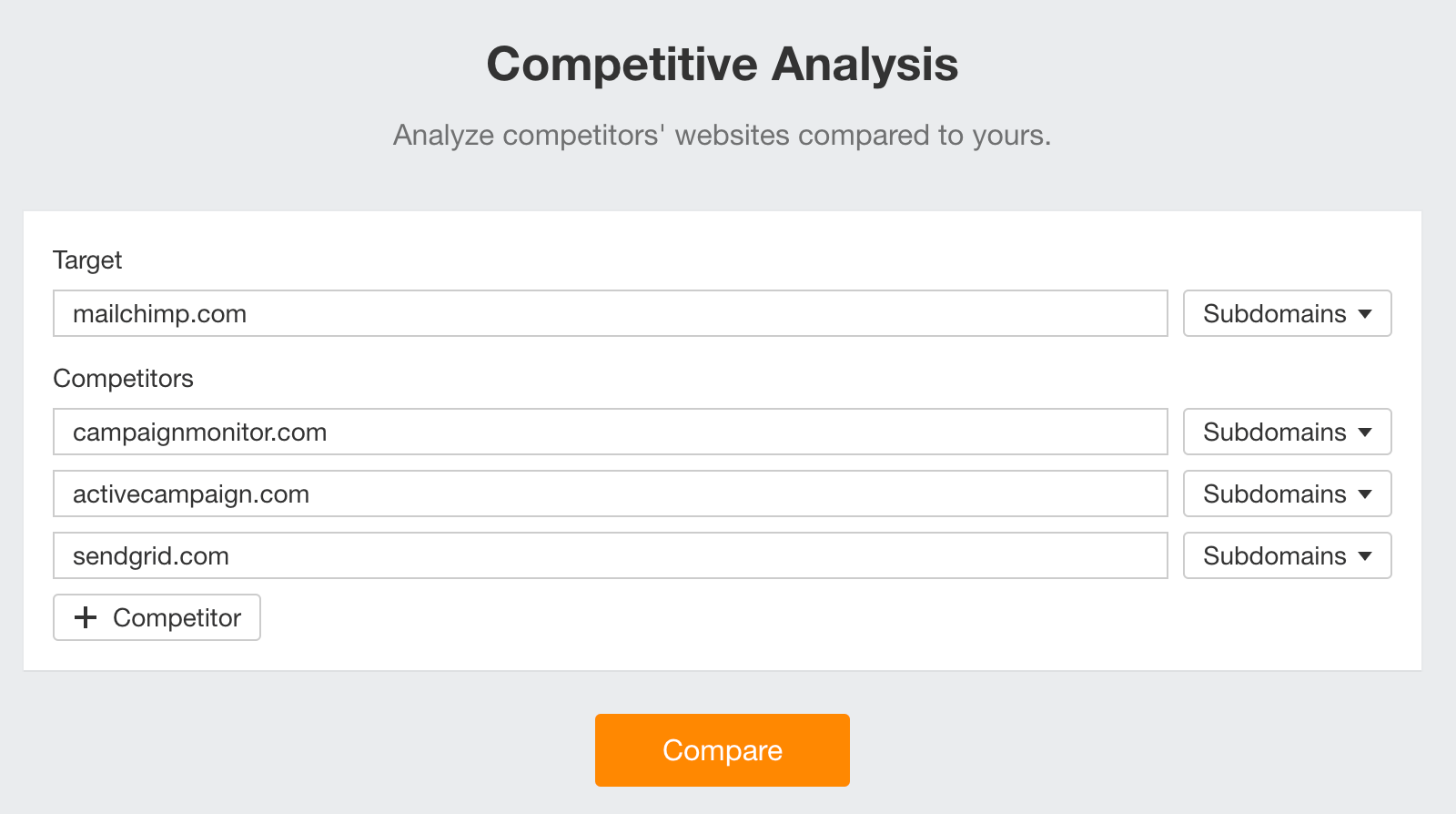
The more competitors you enter, the more keywords you will get.
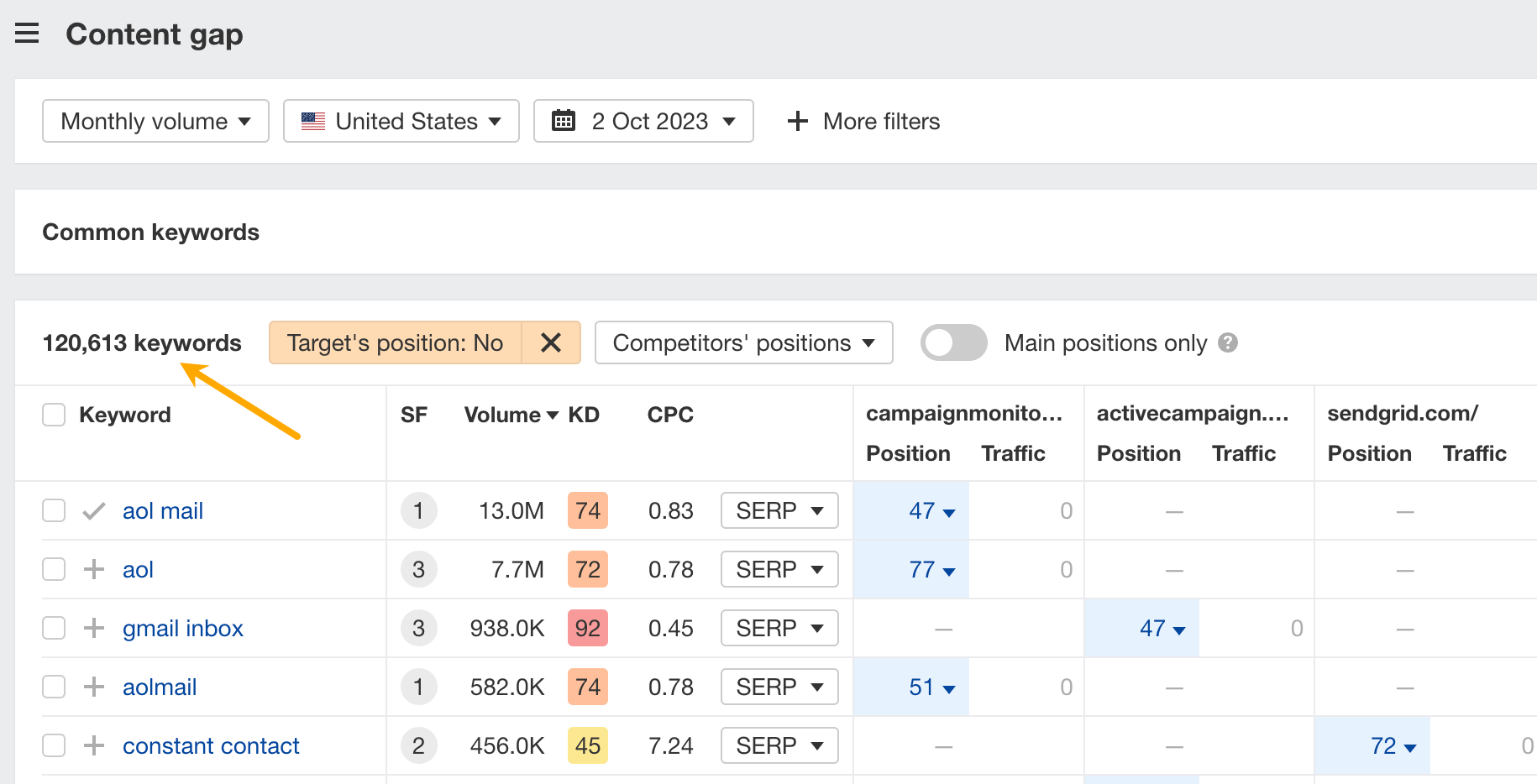
If, at some point, the list gets too big to manage, you can narrow it down using filters. For example, you can focus on keywords where at least two of your competitors rank in the top 10.
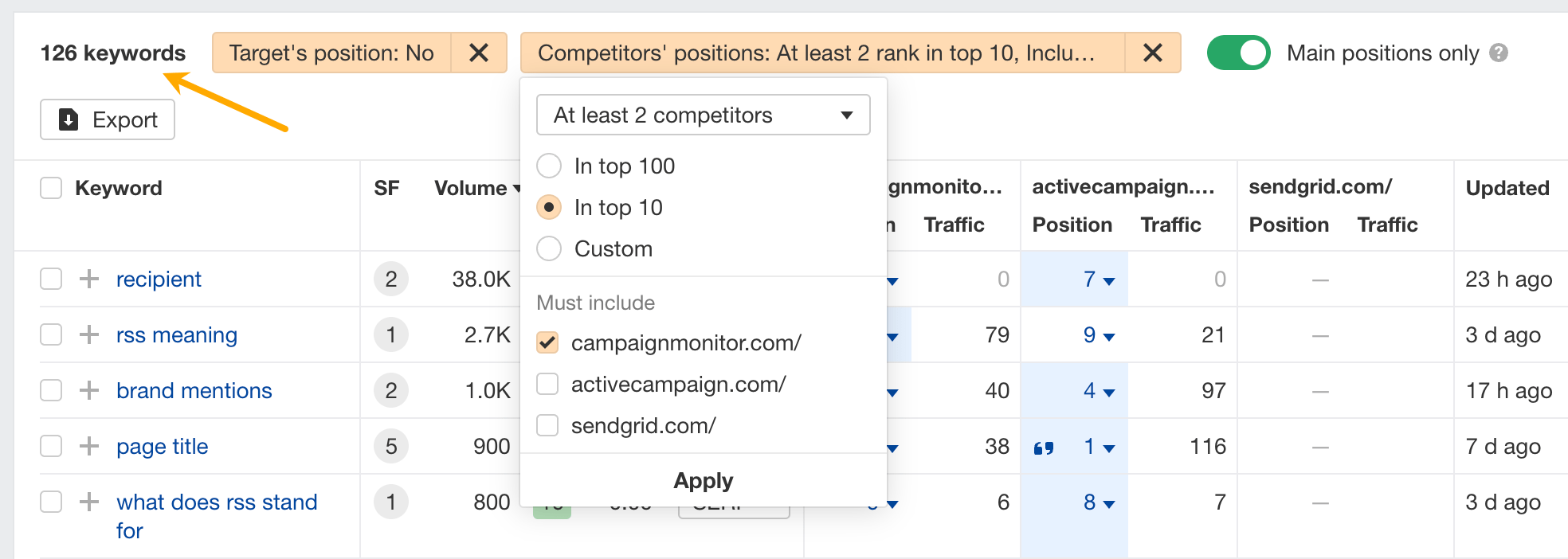
Here are a few interesting keywords Mailchimp could use to fill the content gap:
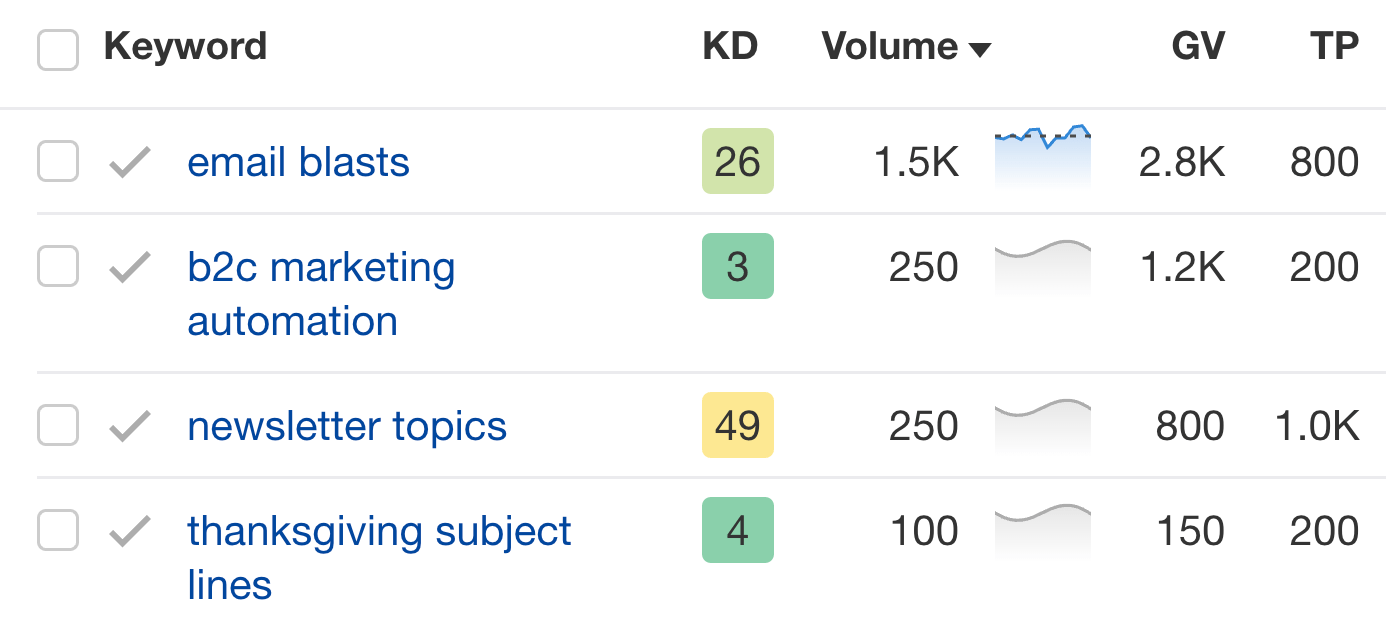
Pricing
Ahrefs equipped with the Competitive Analysis tool (along with other keyword, backlink and SERP analysis tools for competitive analysis) starts at $129 per month, or $108 if you pay annually — see pricing.
You can also try out some of our free SEO competitor intelligence tools. They’re great for quick spot checks like checking your competitor’s organic traffic or checking top backlinks of the content you’re competing with on Google. Find out more in 10 Things You Can Do in Ahrefs for Free.
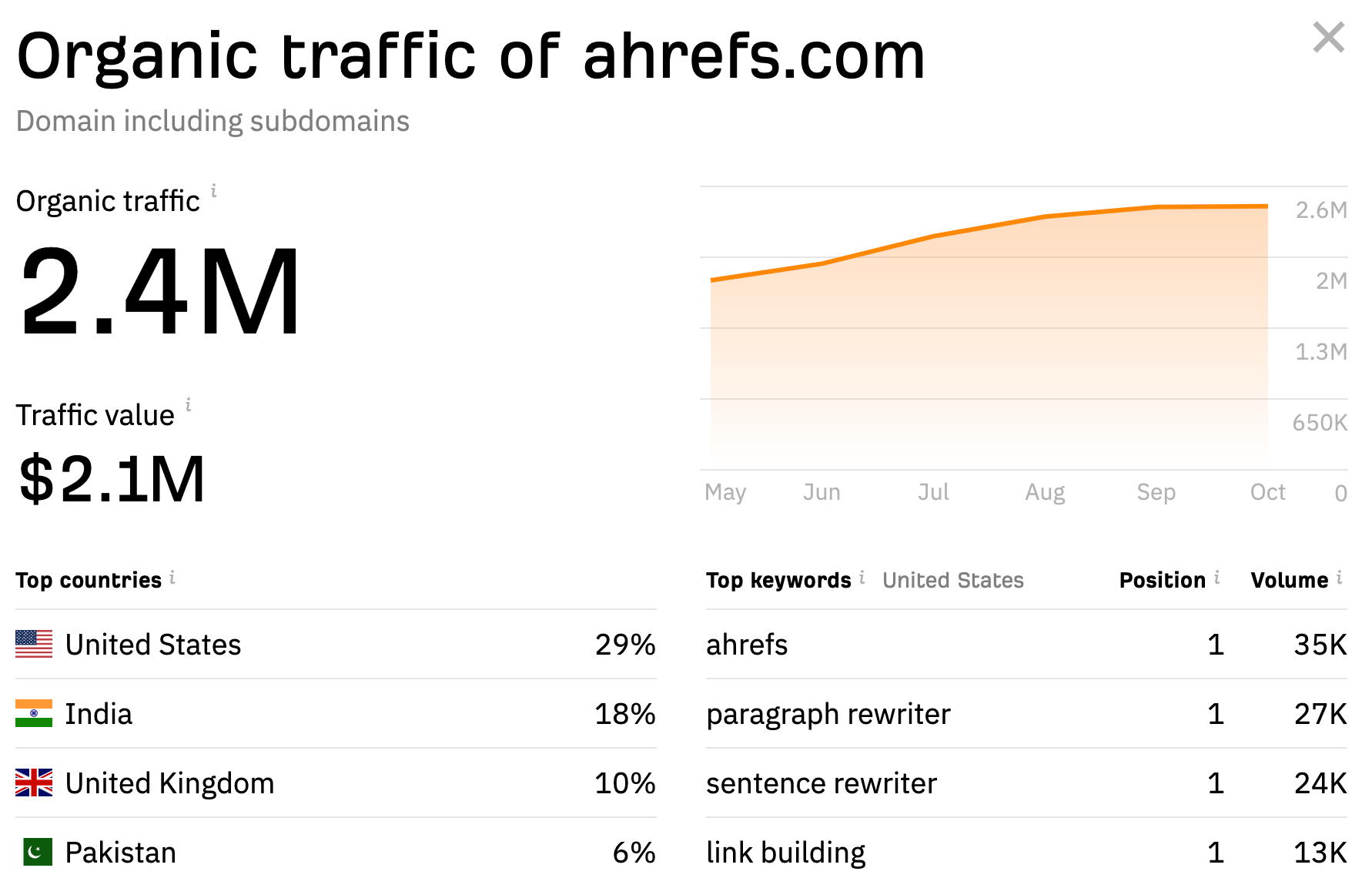
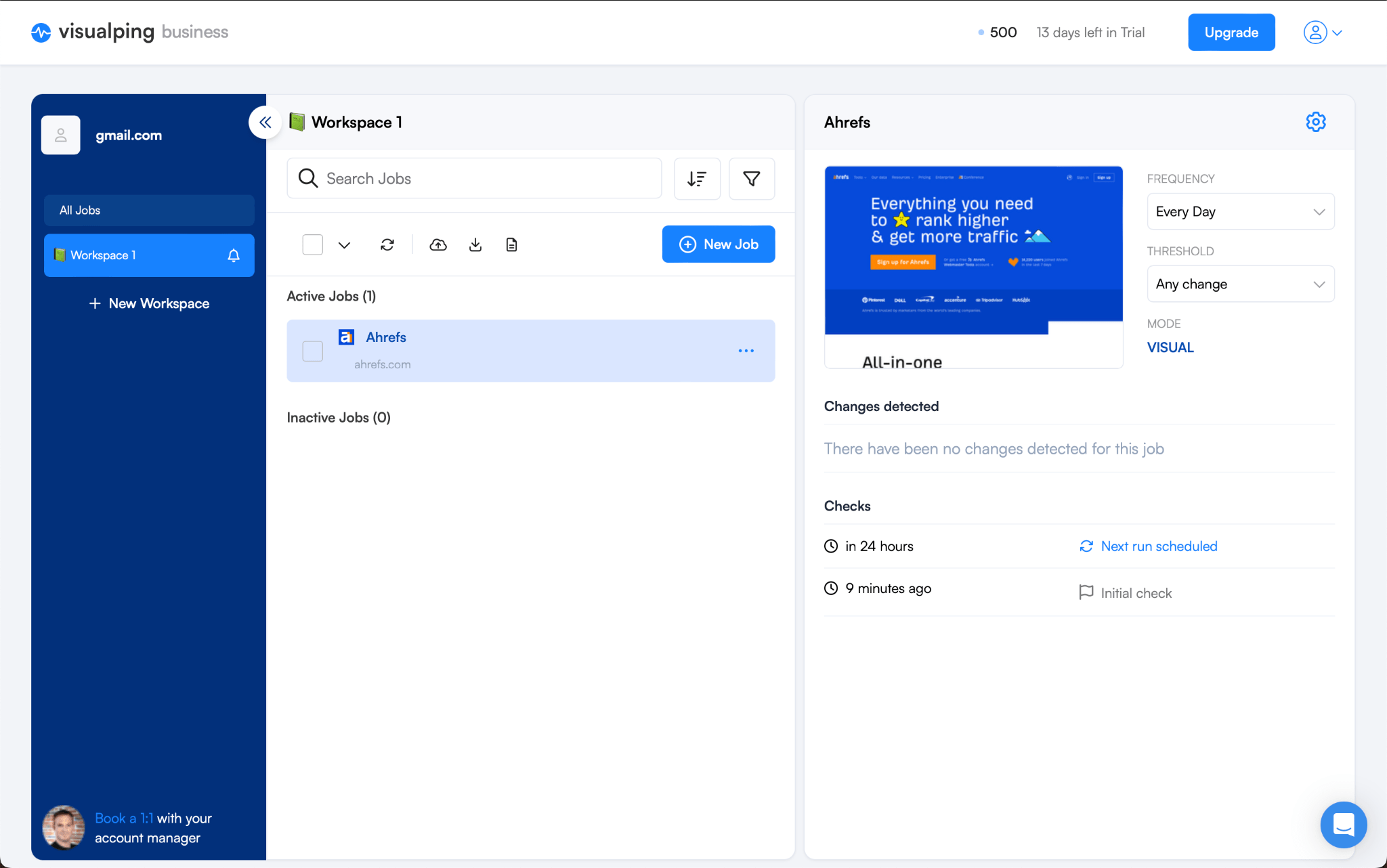
Visualping is a website competitor analysis tool that notifies you anytime your competitors change something on their sites. It uses AI to summarize the web page changes, and it’ll even tell you whether the change is important or not, so you can save time reviewing competitor changes.
This means you no longer need to set reminders to check their websites weekly or strain your eyes searching for the smallest updates, wondering if they were there last week.
How to use it:
- Get inspired by UX and CRO tweaks on competitors’ websites. These tweaks can inspire improvements on your own site, helping you enhance user engagement and increase conversions.
- Monitor competitor’s pricing to inform your pricing strategy. By tracking price changes, discounts, and promotions, you can adjust your prices to better attract customers. For instance, if a competitor drops their prices, you might decide to offer a temporary discount or add extra value to your products to maintain your market position.
- Keep tabs on new job openings to see where your competitors are investing their budgets. Job postings can reveal where they are expanding, what skills they are prioritizing, and which departments are receiving more resources. For example, if a competitor is hiring extensively in their marketing department, it might indicate a planned increase in marketing efforts, prompting you to evaluate and possibly bolster your own marketing strategies to stay competitive.
Standout feature: Monitoring UX and CRO tweaks on competitors’ websites
Visualping is great for observing how your competitors try to squeeze more out of every visitor to their website. In other words, you can look for user experience (UX) and conversion rate optimization (CRO) tweaks that you can adopt without having to do all the research and A/B testing.
All you need to do is set up tracking for the web page you care about, and you’ll get an alert when there’s a noteworthy change. This can include anything from new product launches and press releases to more subtle website changes, like updated CTA buttons and colors.
The alerts feature a screenshot of the page, with the changes highlighted. They also include an AI summary of all the changes, so you can quickly understand what was updated.
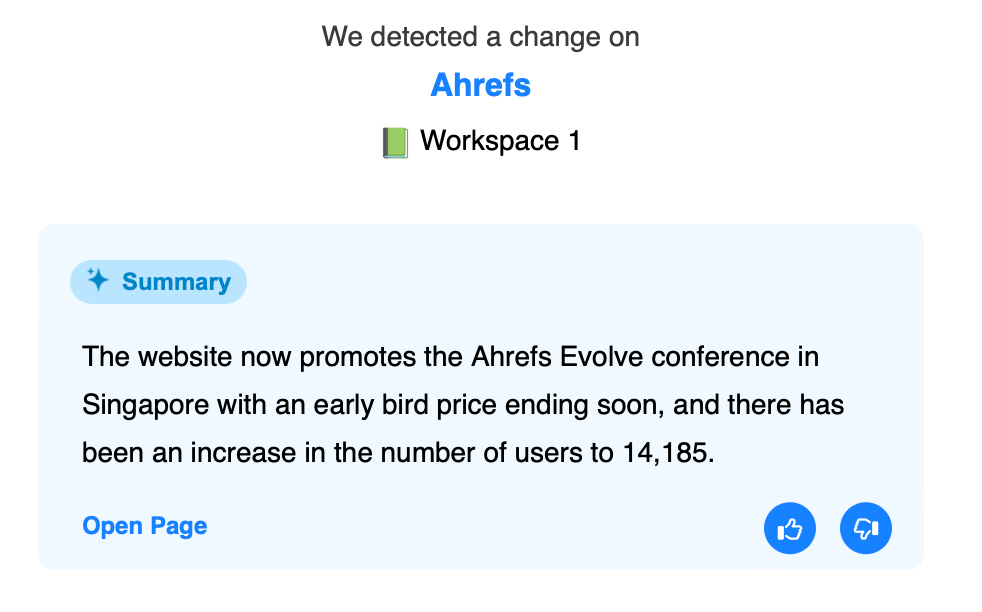
I chatted with the Visualping team, and I’ve been told that you can work with their prompt engineering team to customize the AI for your use case. That way, you’ll know if the change is important based on your preferences.
Keep in mind that you shouldn’t blindly copy your competitors’ actions. Ideally, the change has to make sense to you, and you should know that the competitor does A/B testing (checking with BuiltWith is a good start — more on this below).
Pricing
Visualping offers a free plan with up to 150 checks a month, which would probably be enough to cover your competitors’ homepage, pricing page, trial page, and other important pages weekly.
If you’re more serious about keeping track of your competitors’ websites, then try out the paid plans. Those start at $10 a month for 1000 checks — see pricing.
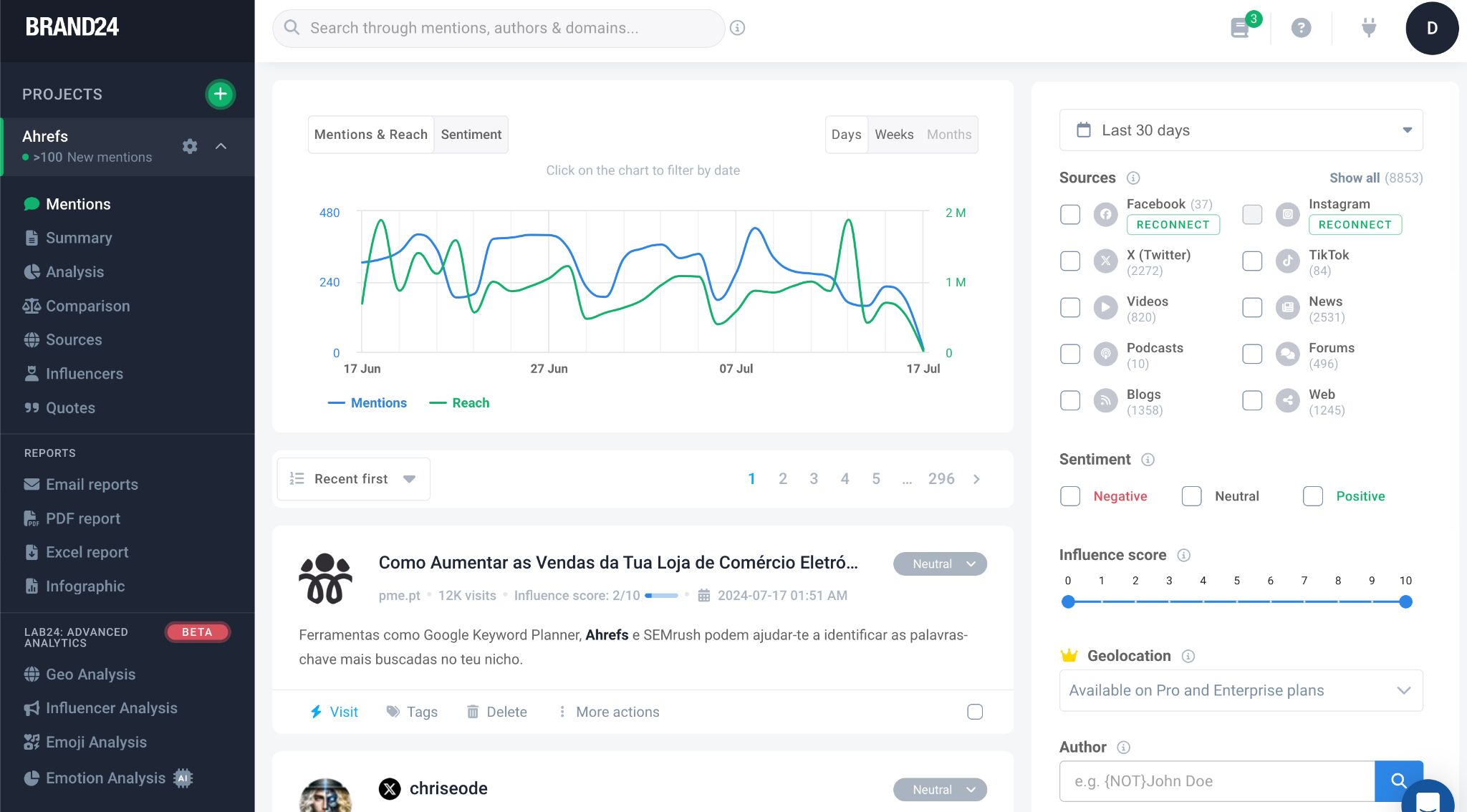
With Brand24, you can track mentions of competitors in social media, news or online publications to reverse engineer their backlink strategies.
They’re best known for their social media monitoring features, so if your strategy is strongly reliant on social media, you’ll definitely want to test out this tool.
How to use it:
- See how effective your competitors’ messaging is in terms of reach, engagement, and sentiment. This will help you understand what resonates with your shared audience, allowing you to refine your own messaging to improve reach, engagement, and overall sentiment.
- Monitor brand mentions to see what people like and dislike about your competitors. Look at reviews, social media posts, and discussions to find out what people love and what they complain about. This can give you ideas on what to do better and how to avoid the same mistakes, helping you make your brand more appealing
My favorite functionality: Monitoring competitors’ brand mentions
Set up a separate project (or projects) with the names of competitor brands and products. You can go broad or be as specific as you like. For example, if your competitor’s brand name has multiple meanings, you can filter out irrelevant keywords with the Excluded keywords field. To illustrate:

Here’s an interesting mention of the project management tool Asana. This could mean that if you were to compete with them, you could include time tracking in one of your less expensive plans to get an edge over your competitor.

This kind of competitor monitoring allows you to:
- Adjust your communication by adopting the most engaging formats and the phrasing your competitors use to promote similar features.
- Get product insights based on the most popular and well-received releases.
- Assess how people perceive your brand and your competitors via sentiment analysis.
- Benchmark your social media reach and share of voice against your competitors.
Pricing
Plans start at $99 a month for tracking three keywords. Tracking your brand and your competitors will require a higher plan for $179 a month that offers seven keywords. You can get two months free off any plan if you pay annually — see pricing. Brand24 also offers a 14-day free trial.
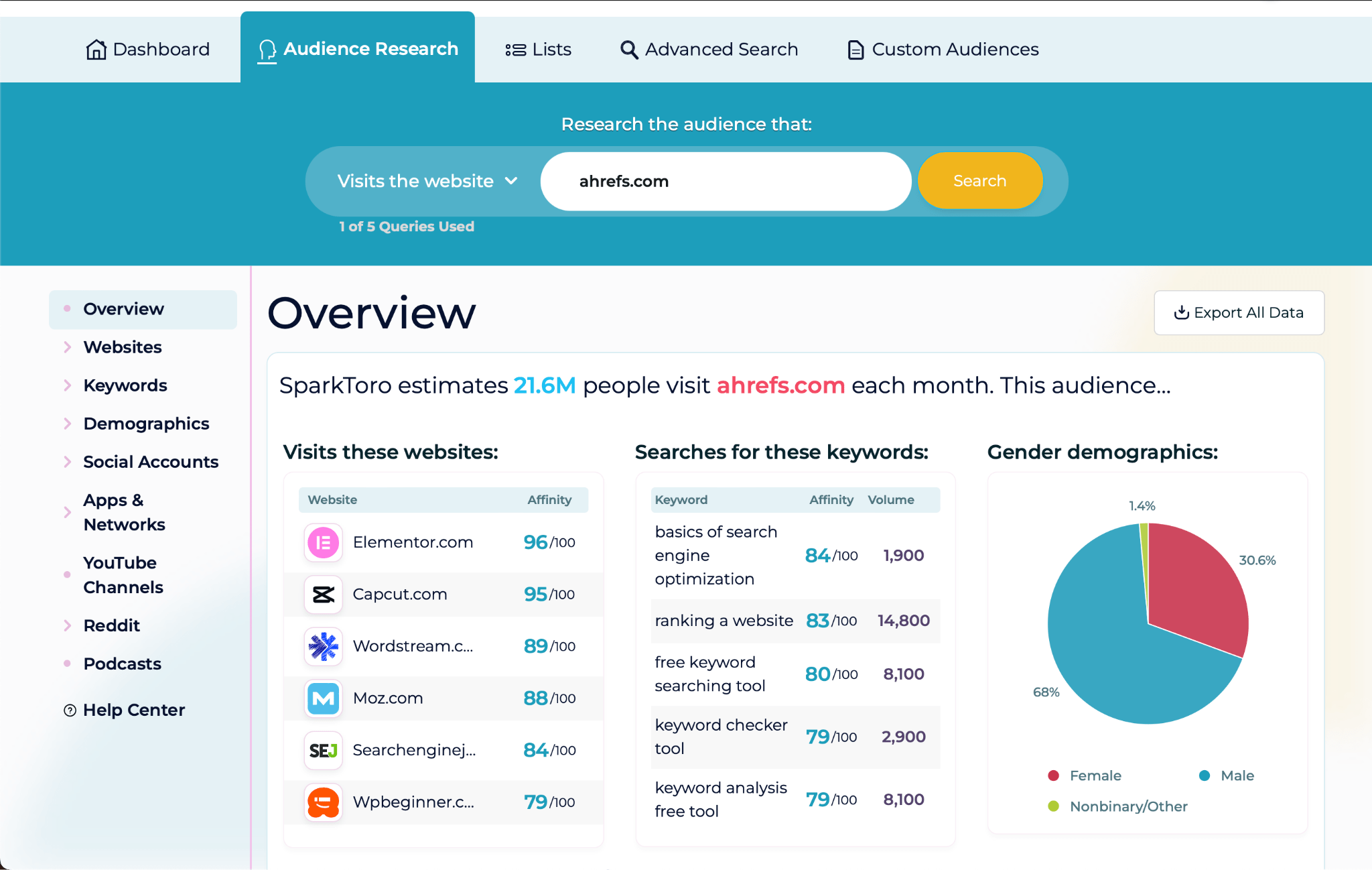
SparkToro is an audience research tool that can provide information about what your competitors’ visitors read, watch, listen to, and follow.
As a competitive analysis tool, it is invaluable for new brands that want to better understand the audience they’d like to reach. With Sparktoro’s insights, you can create more targeted and engaging marketing campaigns, improve your content strategy, and connect with your audience on a deeper level.
If you’re already familiar with this tool, make sure to check out the revamped V2 version launched in April 2024. See a complete list of new features and completely new things you can do with Sparktoro V2 here.
How to use it:
- Find the best places to advertise by checking out the websites and social media profiles your competitor’s audience visits. This helps you choose where to put your ads to reach more people
- Make better customer profiles by looking at the social media profiles of people who follow your competitors. Learn about their interests and hobbies to understand them better and improve your marketing.
- Get new content ideas by seeing what topics your competitor’s audience talks about often. Use this to create content that interests them and grabs their attention.
Standout feature: Discovering where a competitor’s audience hangs out online
Let’s find new sponsorship opportunities by looking for podcasts that people visiting sparktoro.com listen to.

All you need to do is click on “Podcasts” in the left-hand menu, and there you have it.
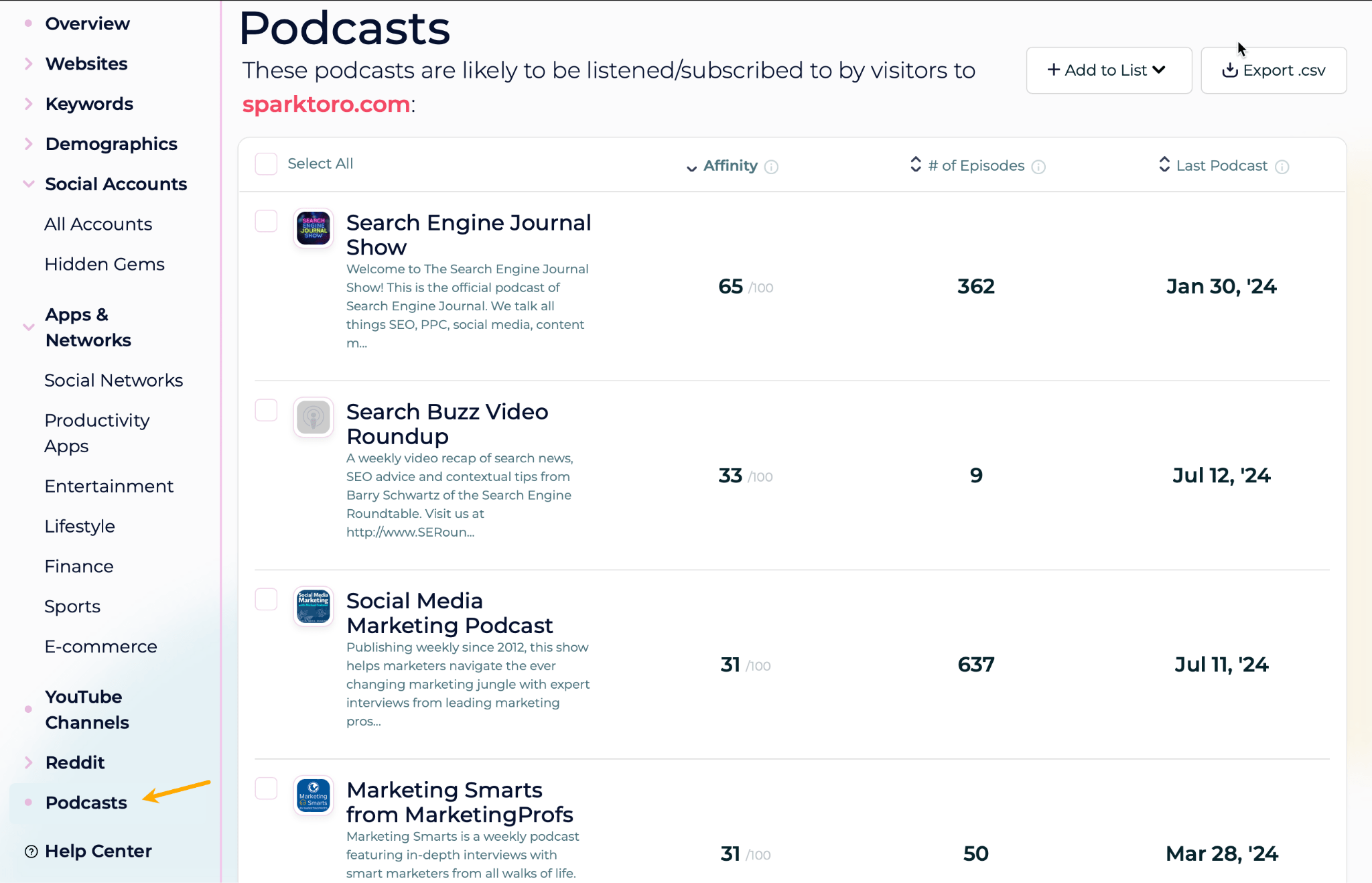
So, in this example, the Search Engine Journal Show is twice as “popular” with Sparktoro’s audience as Marketing Smarts. You can tell that from the Affinity Score metric, which tells you how much behavioral/demographic overlap a given podcast has with Sparktoro’s audience (this score can be found in other reports as well).
With data like this, you can easily spot new advertising and sponsorship opportunities across many different channels. All you need to know is your competitors’ URL or the keyword your audience is likely to use in Google, and Sparktoro does the rest.
Price
SparkToro is free for twenty searches a month with limited report capabilities. Paid plans start at $50 a month (three months free if you pay annually) — see pricing.
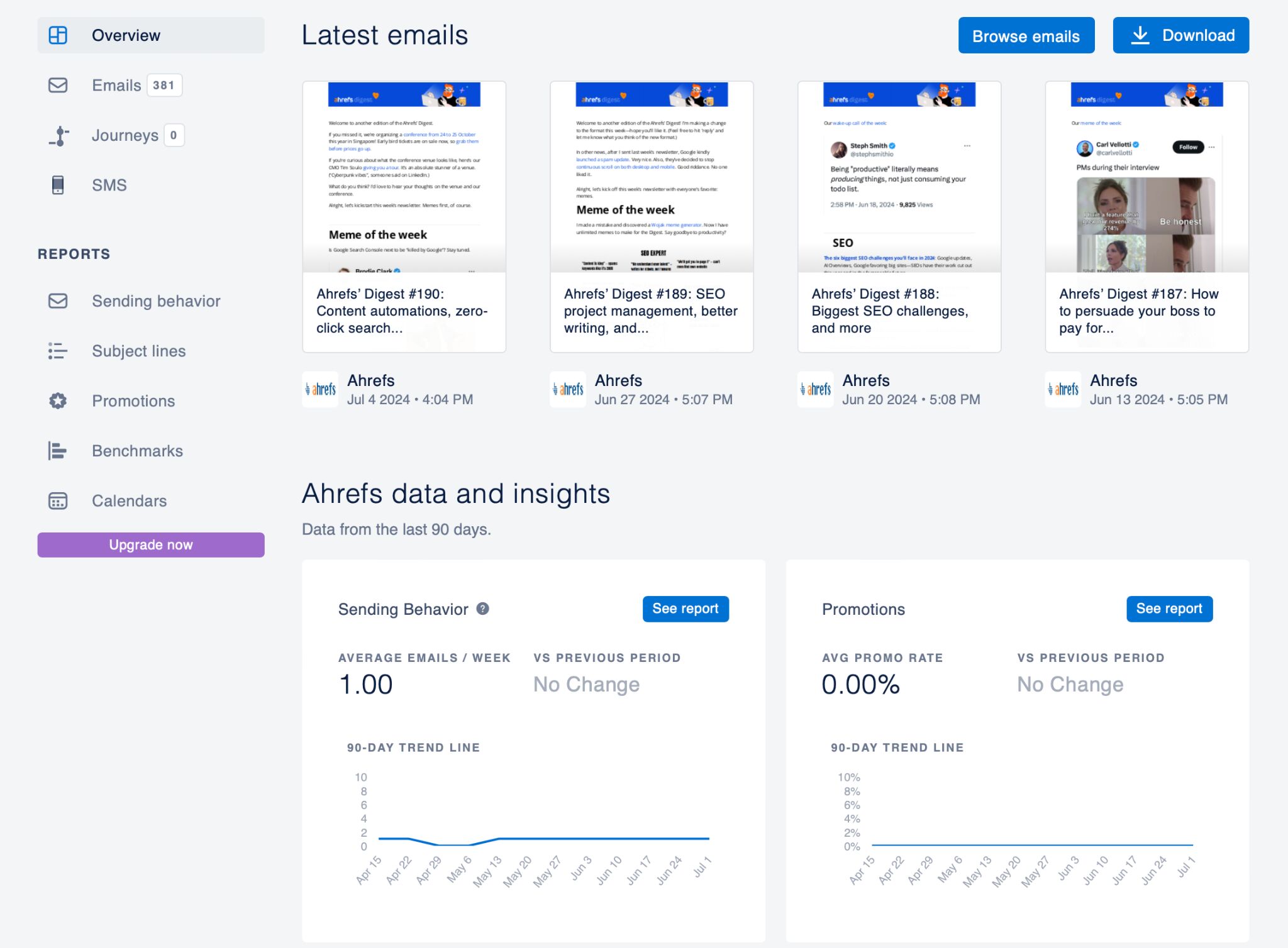
Mailcharts holds a vast collection of email and SMS campaigns, helping you study tactics of brands similar to yours. It’s a rather interesting competitive intelligence tool as it allows you to monitor the hidden automation and flows competitors use as part of their customer experience journey.
How to use it:
- Discover email and SMS campaigns by types or competing brands and get inspired by the copy and (in the case of emails) visual design they use.
- Understand the sending behavior of your competitors (cadence, subject lines, discounts, etc.). Copy what you like, or do something completely different to make your brand stand out.
- Study email marketing automation techniques in your industry. See what features competitors focus on to onboard their users, or how other brands try to make customers come back to their shopping carts.
Standout feature: Studying email marketing automation techniques
Thanks to Mailchart’s Journeys feature, you can study the automated emails that brands send whenever their subscribers trigger a certain action, such as abandoning the cart or creating a project inside an app.
It’s a great feature because it really takes the manual labor out of analyzing one of the most important types of email marketing; imagine trying to find an email trigger manually.
Here’s an example: Mailchart captured a subscription abandonment journey from Masterclass.
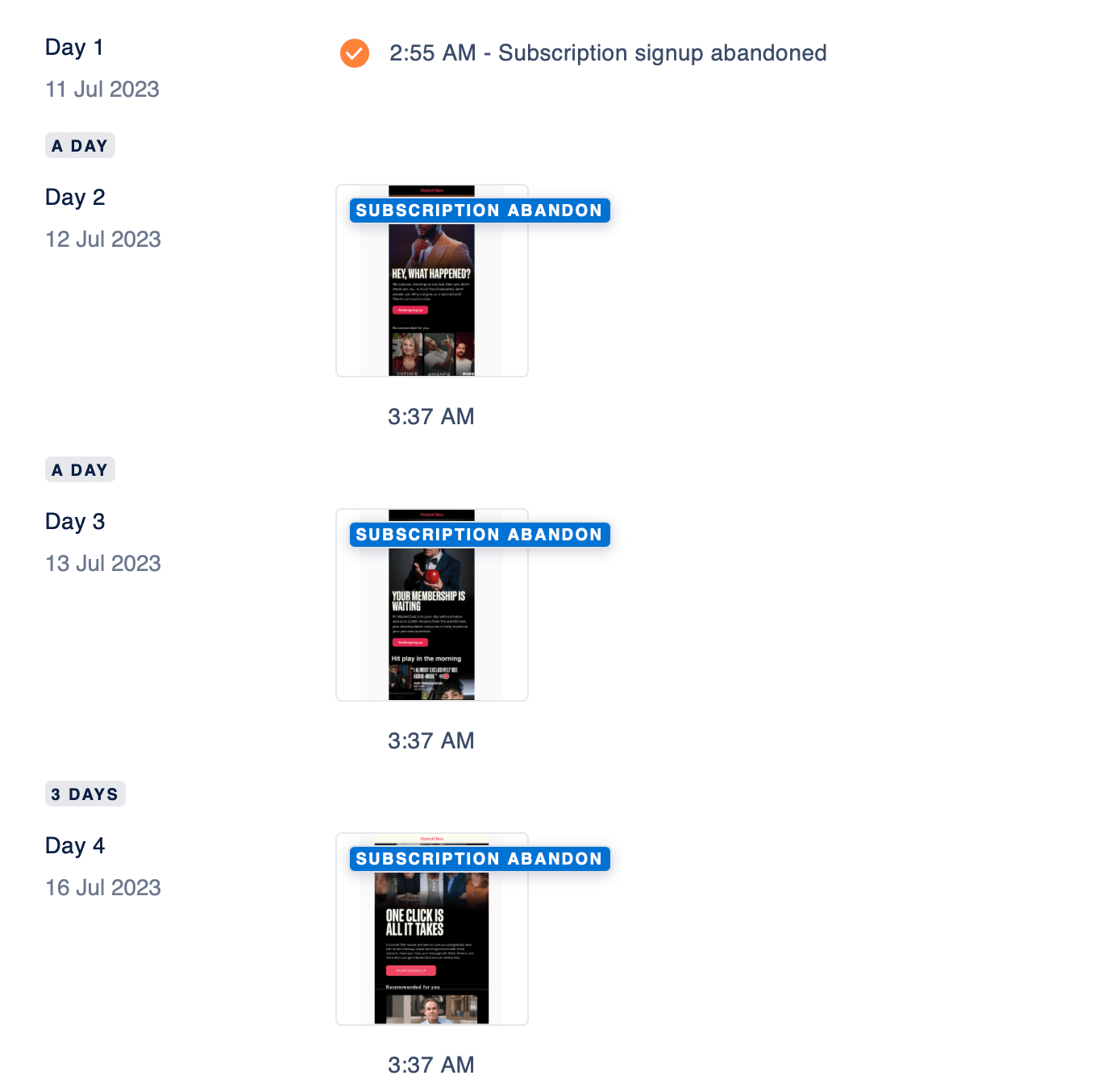
Based on the copy of the emails, you can use the same persuasion techniques to make the user reconsider or use the same time interval between the emails.
Pricing
Mailcharts offers a free plan with 1,000 email samples and a handful of other helpful features. Premium plans start at $149 — see pricing.
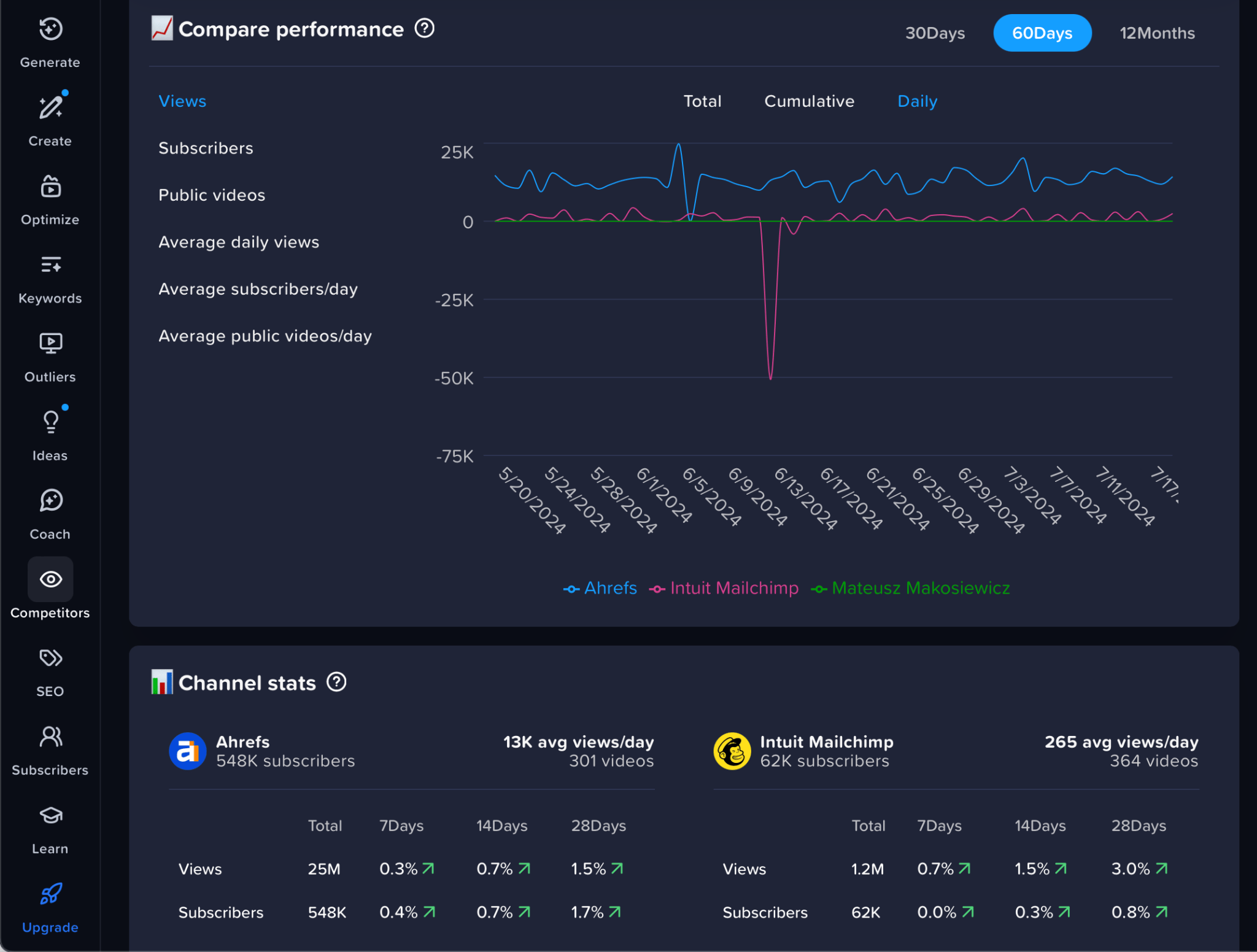
vidIQ is a tool that helps you understand what makes successful YouTube channels tick. It shows you what your competitors are doing right, like which keywords they’re using and which topics are popular.
How to use it:
- Compare your channel with competitors to see how often they post, what topics they choose, and how they edit their videos. This helps you learn what works well for others so you can improve your own channel’s performance.
- Get new content ideas by looking at the keywords other channels use and checking vidIQ’s views per hour metric. This shows you which videos are currently popular, so you can create content that attracts more viewers.
Standout feature: Analyzing performance data right inside YouTube
vidIQ offers an extension to the Chrome web browser that allows you to get data right inside YouTube. In my opinion, some of the most valuable data points provided here are:
- Video tags: You can see which keywords your competitor is trying to target and where they rank. You can use the same ones for your channel or get similar keyword ideas.
- Views Per Hour (VPH) metric: If you spot a video older than a year but still gets a high VPH, this could be an evergreen topic.
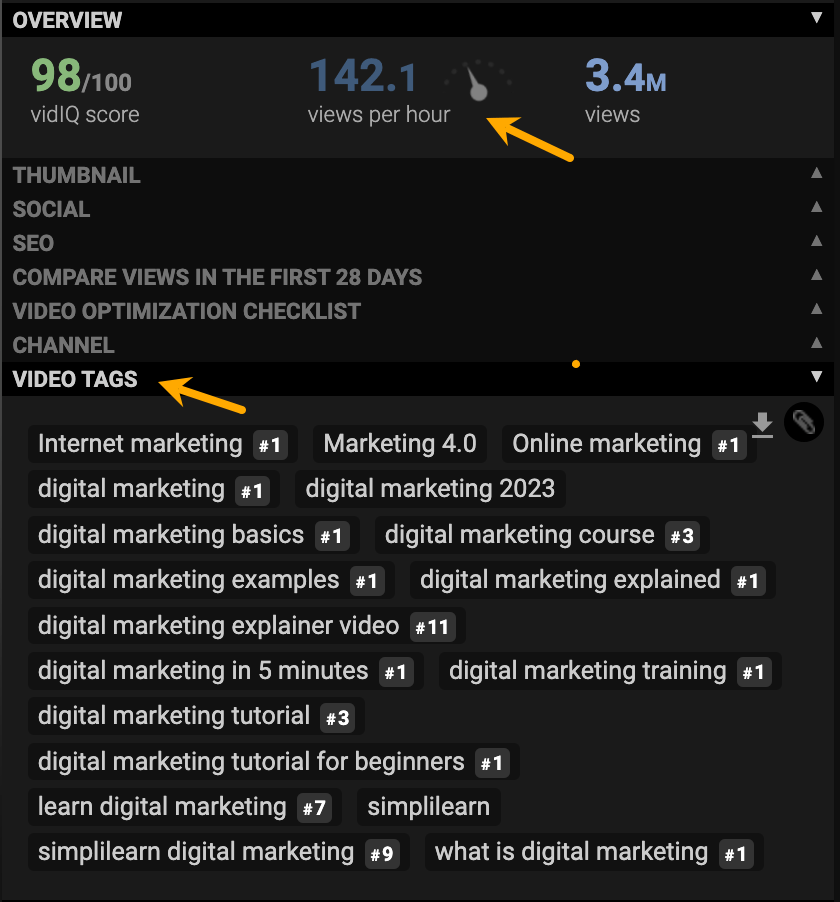
Pricing
The above functionality comes with the free vidIQ plan. But if you’re serious about video marketing and monitoring your competitor’s YouTube channels, definitely consider paid plans that start from $10 ($7.50 if paid annually) — see pricing.
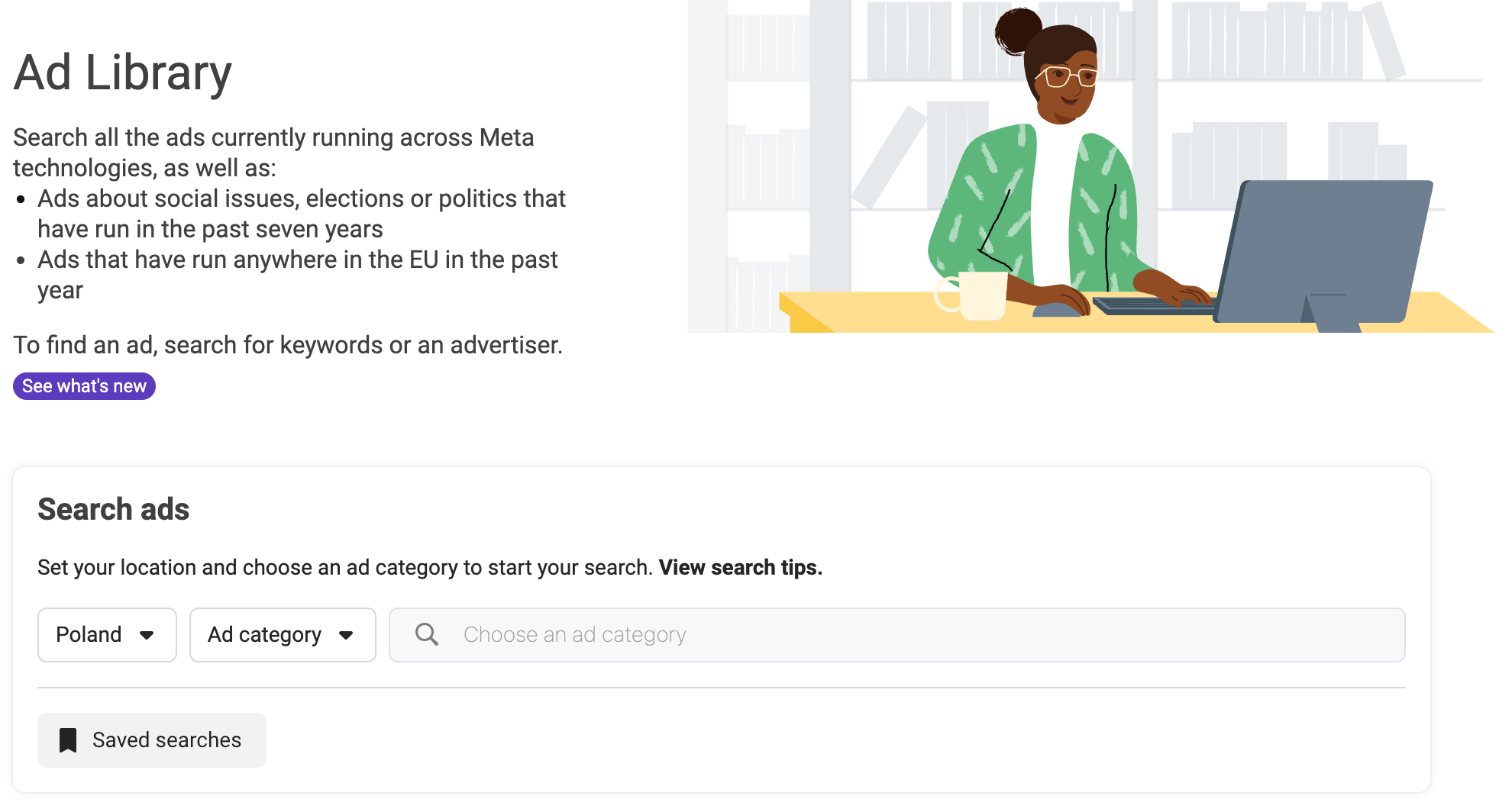
Some ad networks allow you to see all ads currently running on their platforms (and sometimes even archived ads). You can simply look up your competitor and study their ads at no cost. Such libraries are the best PPC competitor tools you can add to your toolkit.
At the time of writing, this type of service is officially supported on:
- Meta (Facebook, Messenger, and Instagram)
- TikTok
- Google Ads
- X
- LinkedIn (no separate library: you need to find your competitor’s profile and then go to Posts/Ads).
How to use them:
- See if your competitor is running any ads in the first place. Establishing that can help you negotiate your marketing budget; if they are investing heavily in ads, you might consider increasing your budget to stay competitive.
- Look for the features or deals they promote the most to inspire your own deals. For instance, if a competitor is offering a special discount or highlighting a particular product feature, you can create similar deals or highlight different features that make your product stand out.
- Study the language and visual design of the ads and landing pages. You can either create something totally different to stand out or use their style as inspiration if you need a quick way to launch your own campaign. For example, if their ads are colorful and bold, you might go for a sleek and minimalist look to differentiate yourself. Or, if their approach seems effective, you can adopt similar strategies to attract attention quickly.
Standout feature: Studying competitors’ campaigns to stand out
Let’s say you’re trying to promote your project management software, and Asana is one of your competitors. A quick search for this advertiser on the Meta ad library reveals a clear pattern: they’re currently using minimalistic visual design to promote their content. Using similar imagery in your ads may not be the best idea because your brand might get confused with theirs or even be seen as a copycat.
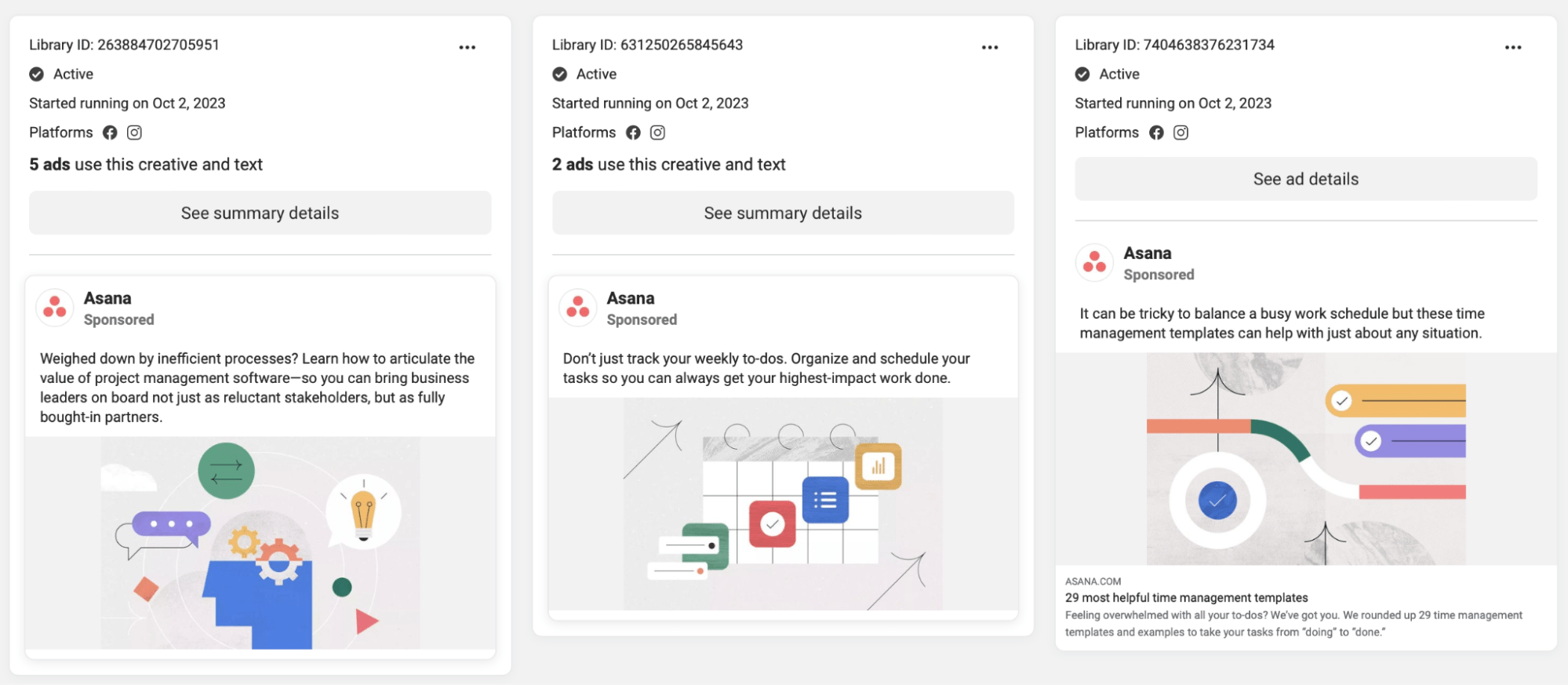
To get extra data on your competitors, look for ads shown in the EU. Due to transparency laws in the EU, the platforms are required to provide additional information such as age, gender and location.

Pricing
All official ad libraries are free.
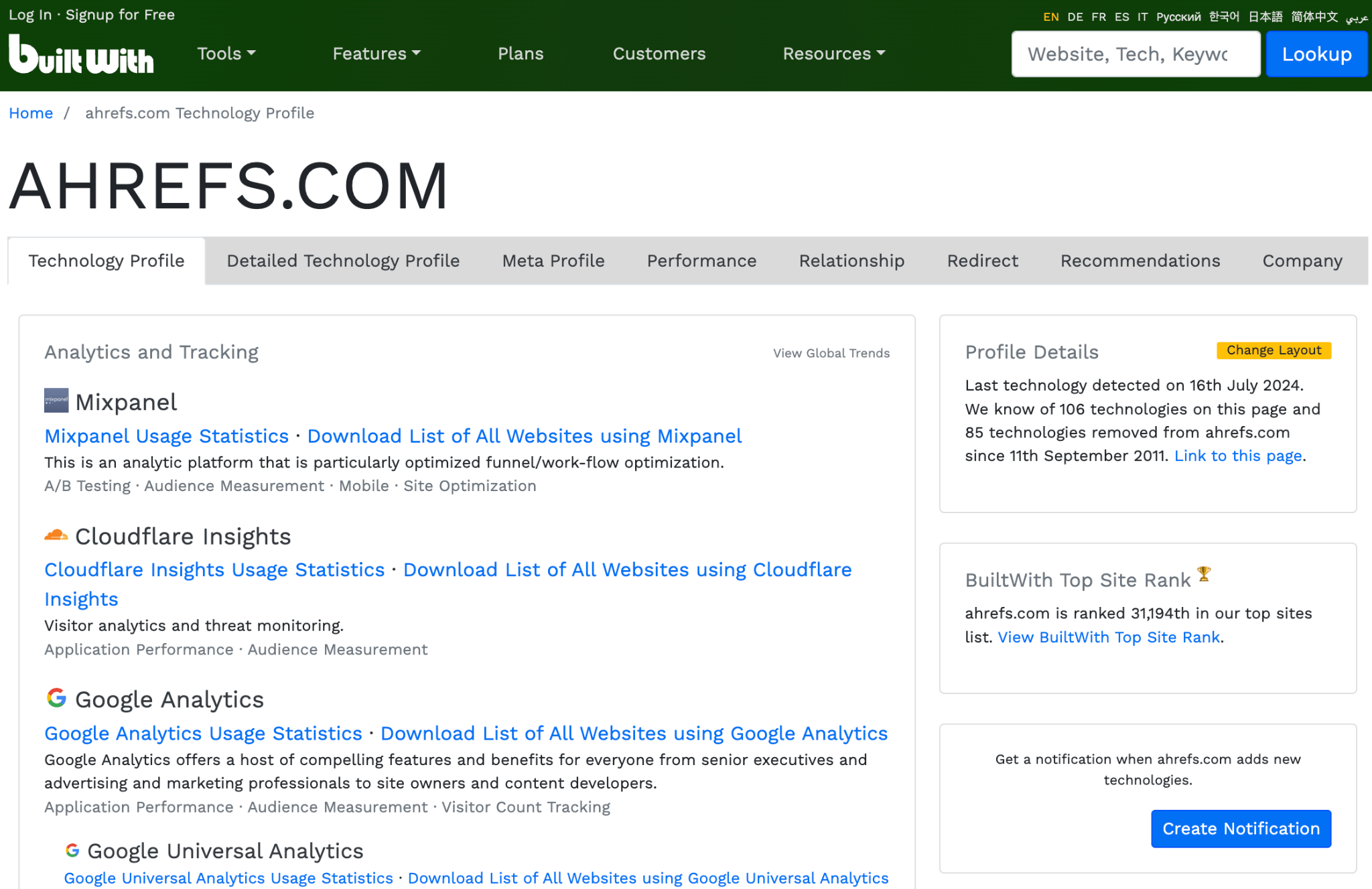
BuiltWith is a tool that helps identify the technologies any website is using, like advertising platforms, payment systems, web servers, and CDNs.
Whereas the previous tools show you “what” competitors are doing, this tool helps to answer the question “how” they are doing it.
How to use it:
- Find niche advertising platforms your competitors use and see if you can advertise there too. By identifying the specific platforms where your competitors are placing their ads, you can reach similar audiences.
- Discover companies that use your competitors’ products — potentially a good source of prospects for your sales team to pursue. If a company is already using a product similar to yours, they might be interested in switching to your offering if you can provide better features, pricing, or customer service. Reach out to these companies with tailored pitches to attract their business.
- Monitor your competitor’s market share to understand how their strategy may be impacting their business. If they are gaining market share, analyze what they are doing right and consider incorporating similar tactics into your own strategy. If they are losing market share, look for opportunities to capitalize on their weaknesses and capture more of the market for your business.
Standout feature: Finding niche advertising platforms
Since most advertising platforms use tracking codes and pixels for retargeting, analytics, and attribution purposes, you’ll see which platforms your competitors are present on.
Finding out that your competitors use Google, Facebook, and Twitter ads isn’t a surprise for anyone, though. But you can find some niche platforms or display networks that may be worth looking into. Here’s an example of what BuiltWith can reveal in its “Analytics and Tracking” section. This company advertises on Reddit:
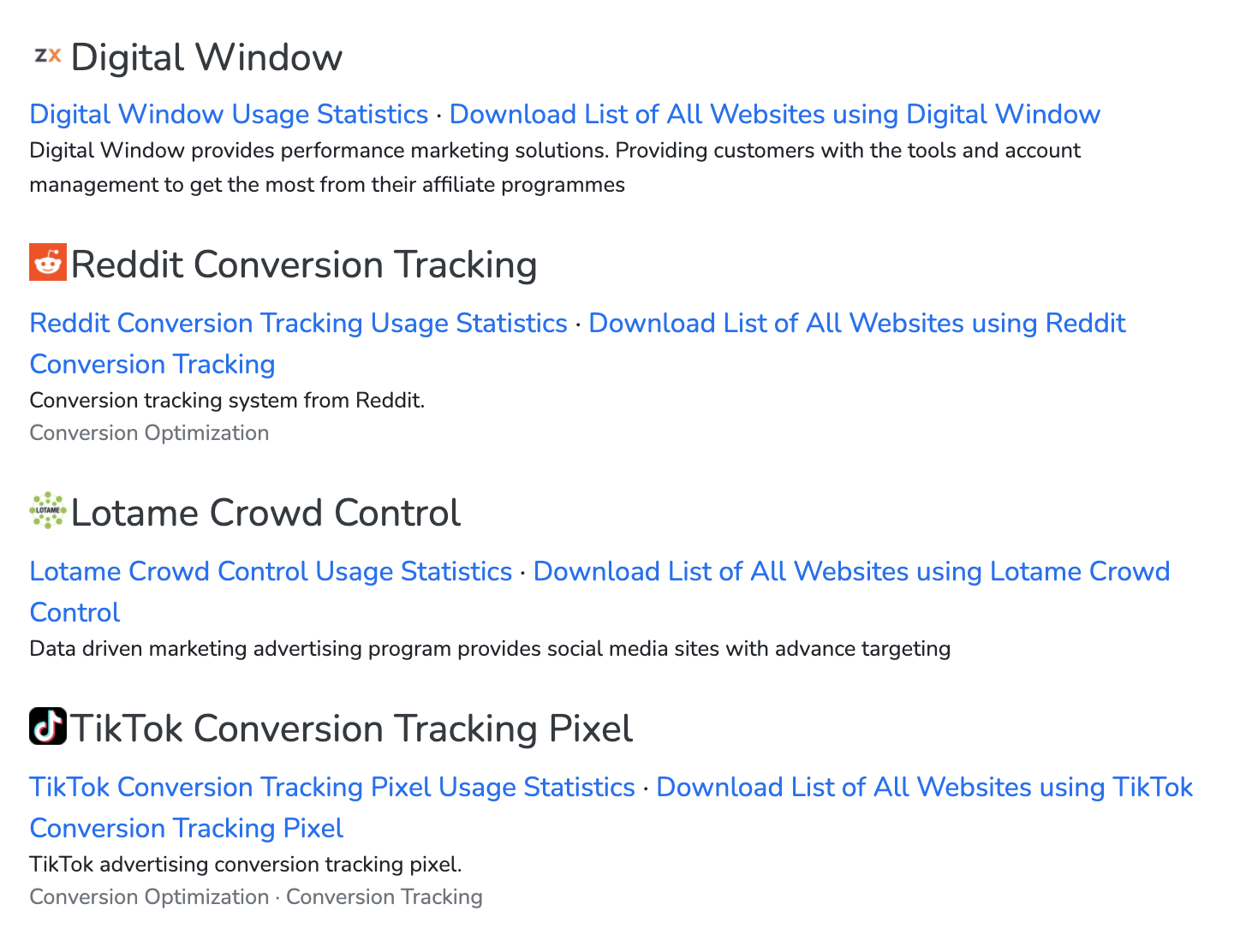
Pricing
BuiltWith is free for the use case I depicted above. Paid plans start from $295/mo and may be worth it for businesses that need a deeper dive into tech stacks — see pricing.
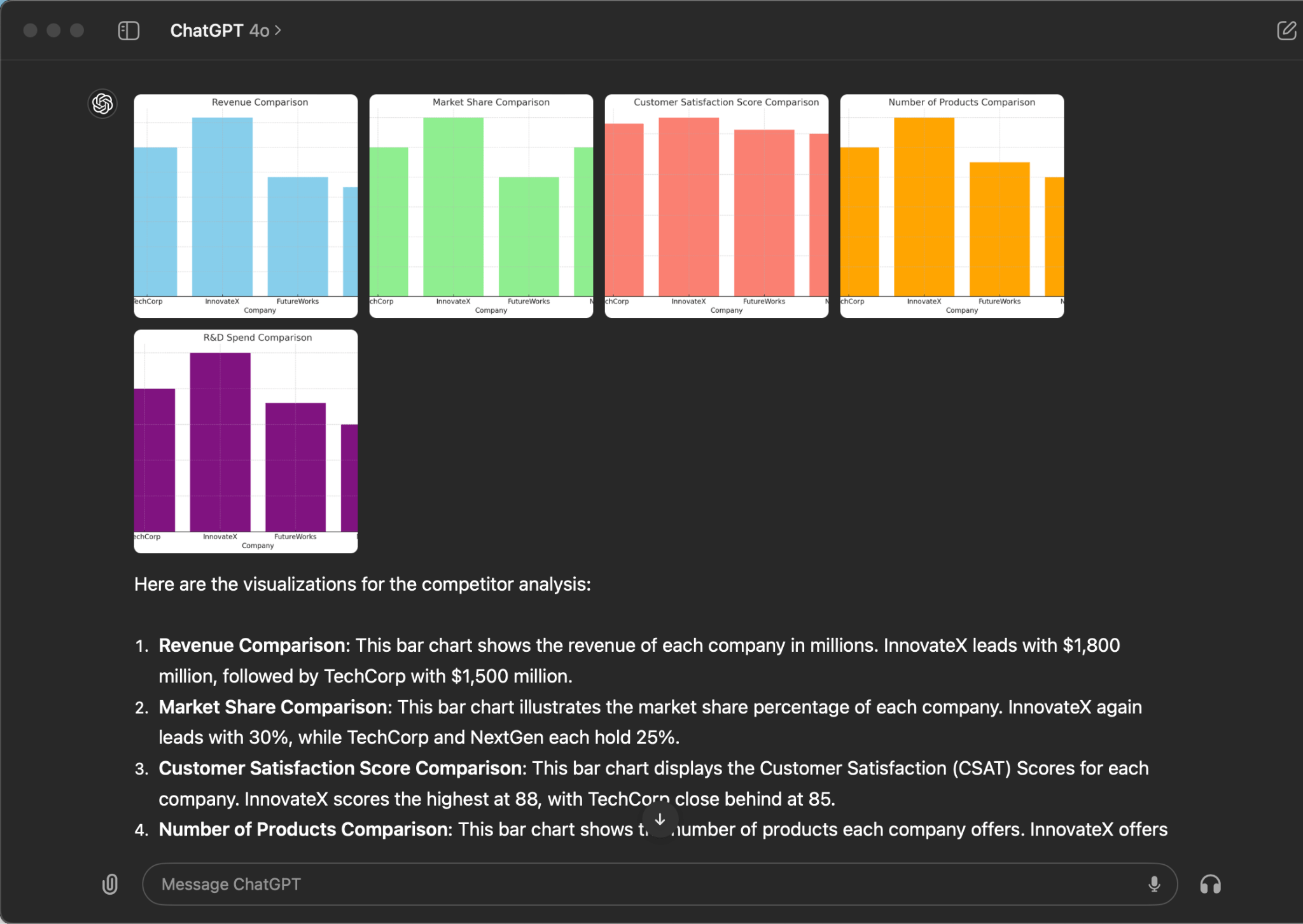
Surprised to see ChatGPT here? The fact is that AI can be incredibly useful in competitor analysis. Advanced AI features, which are often seen in high-end tools, demonstrate this potential:
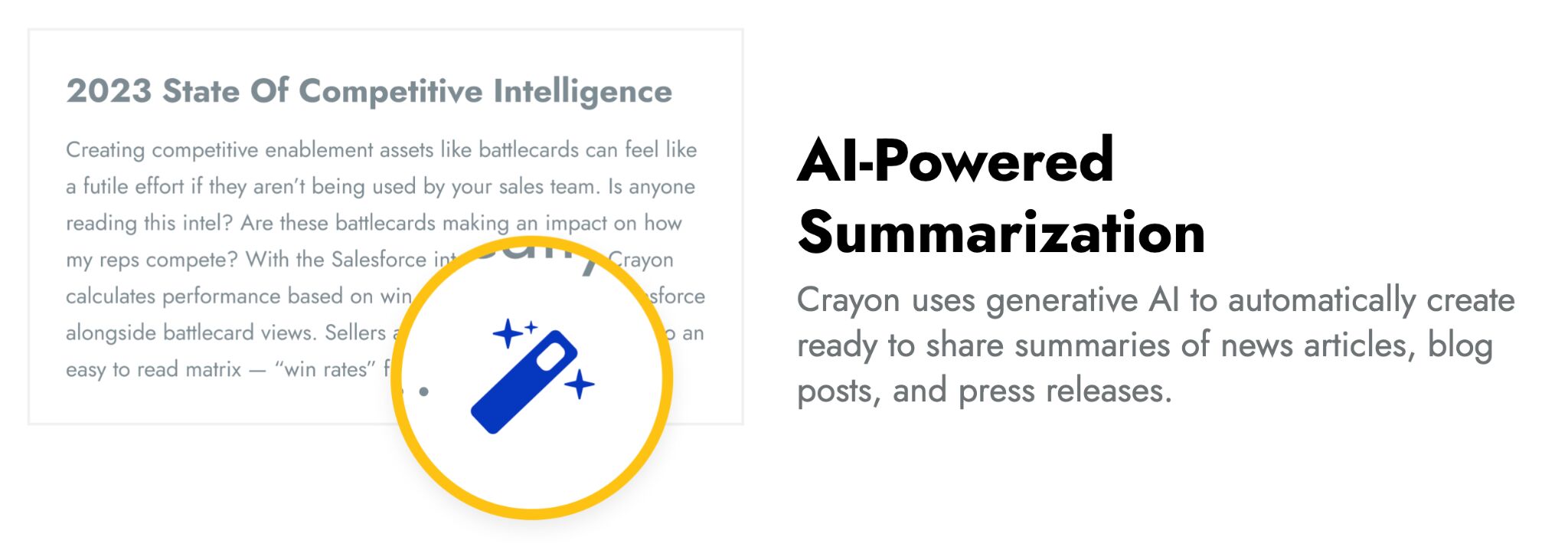
But since these tools are for those who can afford them, you can use ChatGPT along with one of the tools in this article to get similar functionality at a fraction of the cost.
How to use it:
- Ask ChatGPT for content ideas based on popular topics within your industry. You can input competitor blog titles or trending topics, and ChatGPT can help brainstorm new content that resonates with your audience.
- Analyze competitor social media strategies by feeding ChatGPT with their posts. It can help identify successful engagement tactics, common themes, and content that generates the most interaction.
- Ask for ad copy suggestions. If you notice competitors running effective ads, you can input their ad copy into ChatGPT to generate similar, high-impact ad copy tailored to your brand and audience.
- Analyze customer feedback. Input customer reviews and feedback from your competitors into ChatGPT. It can help summarize common praises and complaints, giving you insights into areas.
- Crunch numbers and visualize data. Use ChatGPT to process and interpret numerical data from your competitors. You can input sales figures, engagement metrics, or other relevant data, and ChatGPT can help you analyze trends, create forecasts, and generate visualizations to better understand the competitive landscape.
Standout feature: Analyzing large sets of user reviews to find competitors’ strong and weak points.
I ran this kind of analysis in my guide to competitive analysis. You need data from a review site like Capterra or Trustpilot (you can even manually copy/paste the reviews, it only takes a few minutes) and then this prompt.

As a result, you will get two charts with the top 10 positive and negative things mentioned in the reviews. It will look something like this:
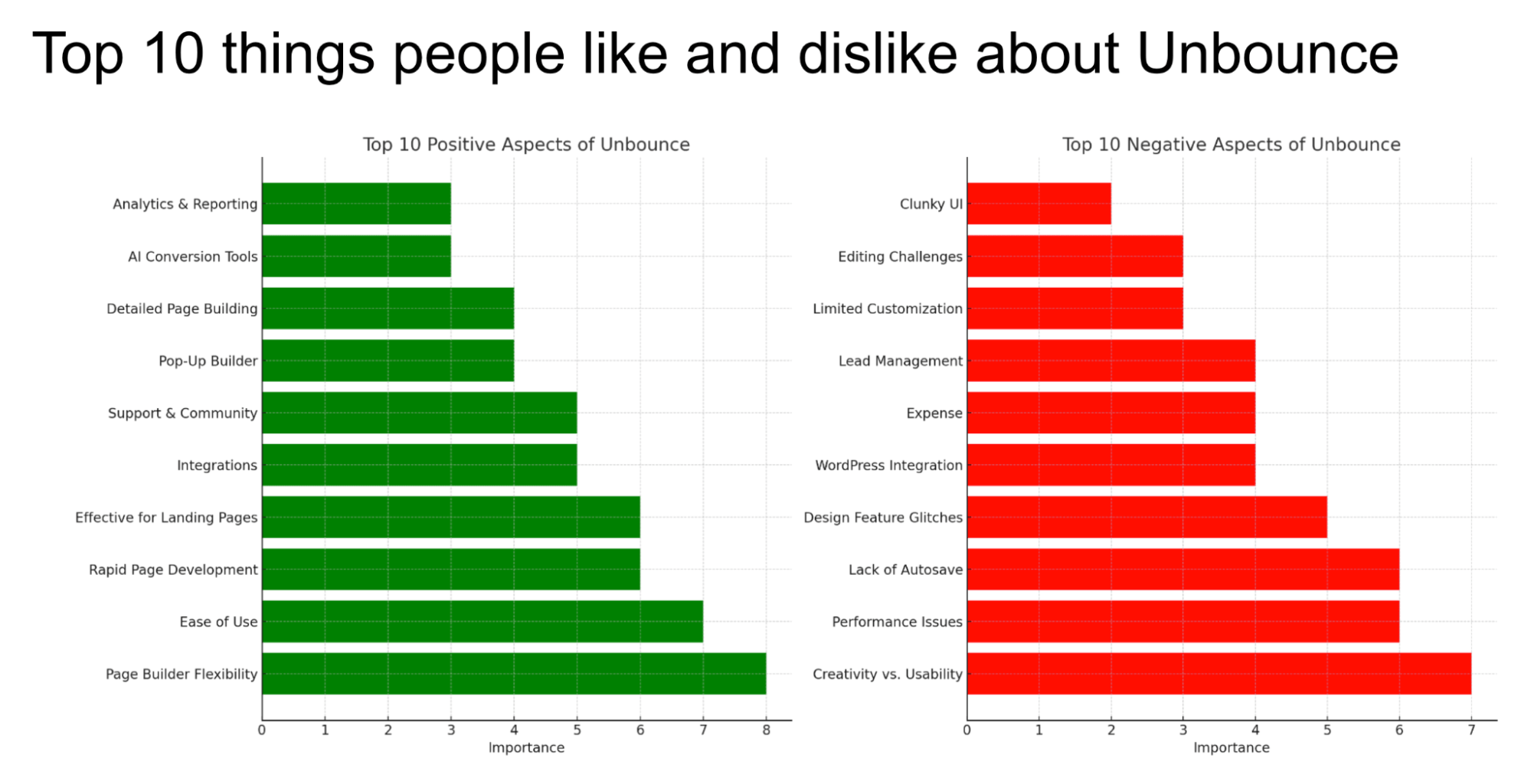
How you can use this data depends on the findings. Generally, you’d want to close any serious feature gaps and use complaints to win over your competitor’s customers. For example, if people complain about the UX aspects, you can devise a campaign around the superiority of your product’s look and feel.
Final thoughts
Before you go, let me highlight a few more competitive analysis resources (not necessarily tools) that are super helpful and mainly free:
- IPO reports (aka S-1 reports) and financial reports of publicly traded companies. Two tips here: try to see if someone already analyzed the paper (example) and see if AI tools like Documind or PDF.ai can help you go through the documents.
- Surveys and focus groups to get quantitative and qualitative data about your market and competitors.
- Ghost shopping to get direct customer experiences from your competitors and possibly uncover their sales tactics.
- Review platforms like G2, TrustPilot, Yelp, or Google My Business to check what your competitors’ customers say.
So that’s it. If you’re just finding out about competitive intelligence tools but are unsure what’s the right way to conduct a competitive analysis, we also have a simple guide (including a template).



